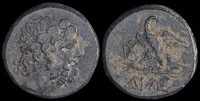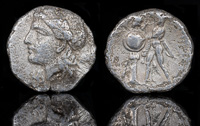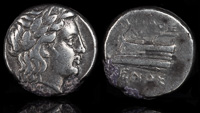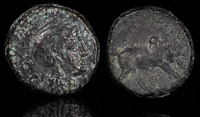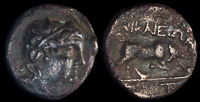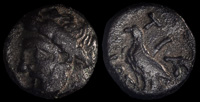Bithynia
Kios founded.
Approximate founding of Kallatis by settlers from Herakleia Pontika.
Herakleia Pontika founded by colonists from Megara and named after Herakles, who it was believed entered the underworld through a nearby cave.
Darius the Great builds a bridge of boats from Kalchedon to Thrace.
August 7
Chios, Kalchedon, Erythrai, and Klazomenai revolt against Athens and is besieged until relieved by Sparta.
Pharnabazos orders ships built at Antandros. At the same time, Syracuse helps Antandros finish its city wall, resulting in citizen privileges for Syracusans there. When the ships are complete, Pharnabazos sails for Kalchedon.
Peace of Antalkidas, arranged by Artaxerxes II, is signed in Susa, ending the Corinthian War. Abydos, Aigai, Kalchedon, Kaunos, Klazomenai, Kyzikos, Parion, Samos, and Adramytteion become part of the Persian Empire.
Eresos, Byzantion, Chios,Mytilene, Methymna, Rhodes, Thebes, Korkyra, Eretria, Kios, Samos, Naxos, Andros, Myrina (Lembos), Hephaistia, Imbros, and Thasos join the Second Athenian League, reaffirming its alliance with Athens in response to the growing threat of Persian interference and internal Greek conflicts.
Klearchos obtains a band of mercenaries and takes control of Herakleia Pontika.
Klearchos is murdered at Herakleia Pontika by Chion and Leon. His brother Satyros takes over.
Satyros murders the families, including the children, of all who took part in the assassination of his brother, Klearchos, in Herakleia Pontika. However, he protects his brothers’ children, including Dionysios.
Death of Satyros of Herakleia Pontika. Timotheos, the son of Klearchos, takes over and makes his brother Dionysios a joint ruler.
Death of Timotheos of Herakleia Pontika. His brother Dionysios is now the sole ruler.
July
After the Battle of the Granicus, Dionysios of Herakleia Pontika increases his power and the size of his kingdom.
Exiles from Herakleia Pontika beg Alexander to remove Dionysios and restore their city to democracy. To protect his interests, Dionysios reaches out to Kleopatra, and on her behalf Alexander leaves him in place.
Dionysios puts up a statue of joy in Herakleia Pontika after the death of Alexander. Exiles attempt to persuade Perdikkas to remove him, but through flattery he is able to remain in power.
Dionysios of Herakleia Pontika marries Amastris, after her first husband Krateros divorces her to marry Phila, the daughter of Antipater.
Demetrios of Phaleron purchases the debts of the philospher Xenokrates of Kalchedon, saving him from slavery.
Antigonos Monophthalmos sails to and secures Cyprus. He is given aid by Dionysios of Herakleia Pontika. Antigonos thus marries his nephew Ptolemaios to Dionysios’ daughter.
Birth of son Klearchos to Amastris and Dionysios of Herakleia Pontika.
Birth of son Oxyathres to Amastris and Dionysios of Herakleia Pontika.
Polyperchon issues a decree to restore democratic governments in all cities to reduce the allure of Kassander. Those exiled due to this may return, with the exception of Amphissa, Pharkadon, Herakleia Pontika, Trikka, and Megalopolis.
Antigonos Monophthalmos destroys the original city of Nikaia and renames it Antigoneia.
Death of Dionysios at Herakleia Pontika. The kingdom is left to his wife Amastris.
Lysimachos takes control of Herakleia Pontika and marries Amastris.
Demetrios Poliorketes blockades the Hellespont, forcing Pleistarchos to turn back. Pleistarchos’ ship is destroyed in a storm on the way to Herakleia and he survives by clinging to the wreckage.
Mithridates I is slain in Kios after appearing to shift his allegiance from Antigonos Monophthalmos to Kassander. He had also ruled Myrleia.
Amastris travels to Sardis with Lysimachos, who turns his attention to Arsinoe II. Amastris returns to Herakleia Pontika.
Antigoneia is captured by Lysimachos and renamed Nikaia, in honor of his recently deceased wife.
Amastris is drowned by her two sons, Klearchos and Oxyathres. The two brothers take over Herakleia Pontika.
Lysimachos returns to Herakleia Pontika and is initially warm to Klearchos and Oxyathres, then kills them for drowning their mother and allows the city to return to democracy.
Arsinoe II begs Lysimachos to let her have Herakleia Pontika. He eventually relents, and she installs Herakleides of Kyme, who becomes tyrant.
Tios regains its autonomy.
March
When news of the death of Lysimachos reaches Herakleia Pontika, they seize the tyrant Herakleides, appoint Phokritos as governor, and make overtures to Seleukos.
July
Zipoetes, the first ruler in the Bithynian dynasty, lays waste to the territory around Herakleia Pontika.
Philip V persuades Kalchedon and Lysimachia to break from the Aetolian League.
Kios and Myrleia destroyed by Philip V, which enrages the Aetolian League.
Nikaia, along with the rest of Bithynia, comes under Roman control.
April
Maximinus Daza takes Herakleia from Licinius after a short siege.
Council of Nicaea is convened by Constantine to address the Arian controversy. Athanasius, a key figure from Alexandria, emerges as a defender of orthodox Christianity against Arianism.
